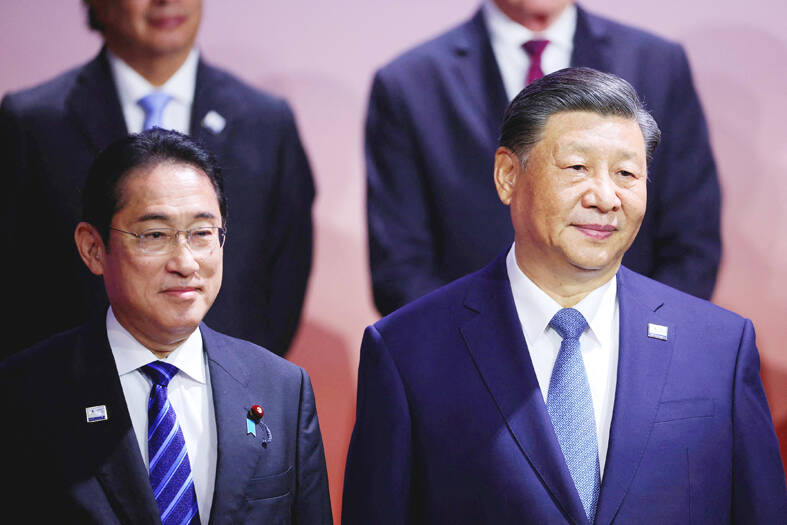Japanese Prime Minister Fumio Kishida and Chinese President Xi Jinping (習近平) agreed to seek a resolution through dialogue to a dispute over wastewater from the Fukushima Dai-ichi nuclear power plant, Kishida said after their first summit in a year.
“I urged that this be dealt with calmly on a scientific basis,” Kishida told reporters in San Francisco.
“We will hold discussions based on science at an expert level,” he added.

Photo:Reuters
Kishida described the summit as “very meaningful.”
Xi told Kishida Japan’s discharge is a matter of international public interest and the country needs to handle the issue in a responsible and constructive manner, China Central Television (CCTV) reported.
The meeting on Thursday came a day after US President Joe Biden hailed an improvement in US relations with China following his own talks with Xi. That warmer tone helped open the way for US ally Japan to pursue its efforts to shore up ties with its biggest trade partner.
The two neighbors have been wrangling over everything from semiconductors to nuclear waste and the fate of Japanese citizens detained in China. A territorial dispute over uninhabited islands near Taiwan continues to simmer.
Kishida said he urged Xi to end a ban on imports of Japanese seafood, imposed by China in response to Japan’s ocean discharge of wastewater from the wrecked Fukushima nuclear plant.
The International Atomic Energy Agency has said the release is safe.
The wastewater issue has hurt sales in China for Japanese companies including cosmetics company Shiseido Co, which slashed its profit forecast last week. The Chinese reaction has been a factor in turning the Japanese public to their most negative on China since 2014, according to a poll that was published last month.
Xi told Kishida at the start of the meeting that the two countries should focus on common interests, properly handle differences and re-confirm their reciprocal strategic relationship, the CCTV reported.
Supply chains between Japan and China are deeply intertwined, he said, adding it was in no one’s interest to decouple and break those chains, Chinese state news agency Xinhua reported.
“I want to work with you to create a brighter future for Japan-China ties for the sake of the next generation,” Kishida responded.
The leaders also agreed to restart high-level economic talks at an appropriate time, the Japanese Foreign Ministry said in a statement.
Tokyo last year dubbed its neighbor an “unprecedented security challenge” and is planning its biggest military buildup since World War II, a stance that has riled Beijing.
During the meeting Kishida also called for the release of Japanese citizens being held in China, calling for the individuals to be returned. The detentions have cast a pall over the business environment in China, although Beijing has defended its moves as part of the protection of its national security.

STILL COMMITTED: The US opposes any forced change to the ‘status quo’ in the Strait, but also does not seek conflict, US Secretary of State Marco Rubio said US President Donald Trump’s administration released US$5.3 billion in previously frozen foreign aid, including US$870 million in security exemptions for programs in Taiwan, a list of exemptions reviewed by Reuters showed. Trump ordered a 90-day pause on foreign aid shortly after taking office on Jan. 20, halting funding for everything from programs that fight starvation and deadly diseases to providing shelters for millions of displaced people across the globe. US Secretary of State Marco Rubio, who has said that all foreign assistance must align with Trump’s “America First” priorities, issued waivers late last month on military aid to Israel and Egypt, the

France’s nuclear-powered aircraft carrier and accompanying warships were in the Philippines yesterday after holding combat drills with Philippine forces in the disputed South China Sea in a show of firepower that would likely antagonize China. The Charles de Gaulle on Friday docked at Subic Bay, a former US naval base northwest of Manila, for a break after more than two months of deployment in the Indo-Pacific region. The French carrier engaged with security allies for contingency readiness and to promote regional security, including with Philippine forces, navy ships and fighter jets. They held anti-submarine warfare drills and aerial combat training on Friday in

COMBAT READINESS: The military is reviewing weaponry, personnel resources, and mobilization and recovery forces to adjust defense strategies, the defense minister said The military has released a photograph of Minister of National Defense Wellington Koo (顧立雄) appearing to sit beside a US general during the annual Han Kuang military exercises on Friday last week in a historic first. In the photo, Koo, who was presiding over the drills with high-level officers, appears to be sitting next to US Marine Corps Major General Jay Bargeron, the director of strategic planning and policy of the US Indo-Pacific Command, although only Bargeron’s name tag is visible in the seat as “J5 Maj General.” It is the first time the military has released a photo of an active

CHANGE OF MIND: The Chinese crew at first showed a willingness to cooperate, but later regretted that when the ship arrived at the port and refused to enter Togolese Republic-registered Chinese freighter Hong Tai (宏泰號) and its crew have been detained on suspicion of deliberately damaging a submarine cable connecting Taiwan proper and Penghu County, the Coast Guard Administration said in a statement yesterday. The case would be subject to a “national security-level investigation” by the Tainan District Prosecutors’ Office, it added. The administration said that it had been monitoring the ship since 7:10pm on Saturday when it appeared to be loitering in waters about 6 nautical miles (11km) northwest of Tainan’s Chiang Chun Fishing Port, adding that the ship’s location was about 0.5 nautical miles north of the No.